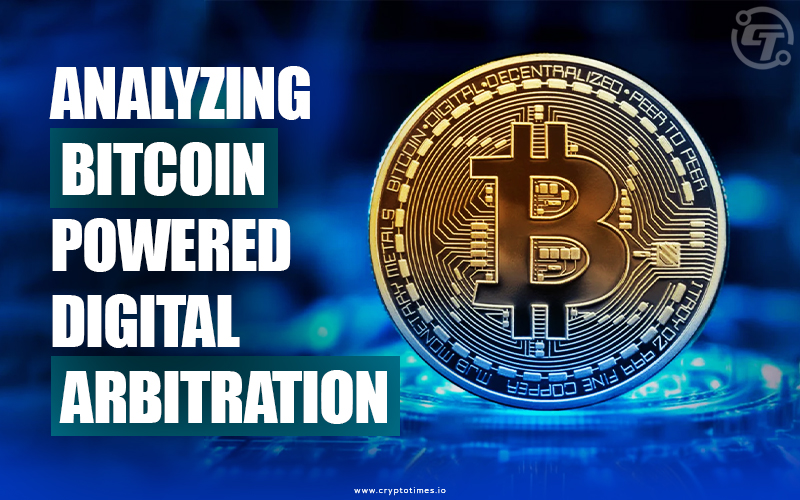In the realm of dispute resolution, a notable shift towards digitization has emerged, marking a significant evolution in how conflicts are addressed. At the forefront of this transformation is the introduction of cryptocurrency, notably Bitcoin, signifying a pivotal moment in the landscape.
This exploration delves into the integration of Bitcoin within digital arbitration, addressing the inherent need to redefine traditional dispute resolution methods. Traditional approaches, fraught with challenges such as inefficiency and limited accessibility, face a paradigm shift as Bitcoin introduces a decentralized and secure alternative, promising a transformative way to resolve conflicts in the digital age.
In light of technological advancements shaping societal norms, there arises a necessity for transformative approaches in dispute resolution. This article seeks to unravel the potential of Bitcoin in enhancing digital arbitration systems, offering a glimpse into a future where decentralized currencies assume a central role in resolving conflicts.
Amidst this landscape, it is noteworthy to mention “Immediate Flik,” an online trading system that aligns seamlessly with the principles of decentralized currencies.
The Landscape of Digital Arbitration
To comprehend the significance of Bitcoin in digital arbitration, it is imperative to juxtapose traditional and digital arbitration methods. Examining the limitations of existing systems lays the groundwork for understanding why a shift towards decentralized solutions is necessary.
Traditional vs. Digital Arbitration: A Comparative Analysis
1. Inherent Limitations of Current Systems
Current digital arbitration systems exhibit shortcomings such as procedural complexities and susceptibility to external manipulation. By identifying these limitations, we can better appreciate the potential of Bitcoin to address these issues and redefine the efficiency and fairness of arbitration processes.
2. Technological Reshaping of Dispute Resolution
Technology plays a pivotal role in reshaping dispute resolution. The exploration of how digital systems and instruments have already impacted this field sets the stage for understanding the unique contribution of Bitcoin to the evolving landscape of digital arbitration.
Understanding Bitcoin in Arbitration
A foundational understanding of Bitcoin is essential for appreciating its potential in arbitration. We explore the decentralized nature, cryptographic principles, and transparency that define Bitcoin and distinguish it from traditional currencies.
Bitcoin’s incorporation in arbitration processes introduces benefits such as increased transparency, reduced reliance on intermediaries, and enhanced security. This section examines how these advantages contribute to more efficient and fair dispute resolution.
Integrating Bitcoin into legal frameworks is not without challenges. This section addresses concerns related to regulatory compliance, potential misuse, and the adaptability of legal structures to accommodate the nuances of cryptocurrency in dispute resolution.
Blockchain Technology and Smart Contracts
1. Synergy between Bitcoin and Blockchain
The integration of Bitcoin is intrinsically linked to blockchain technology. We explore how the decentralized and distributed ledger system of blockchain complements Bitcoin, providing a robust foundation for transparent and immutable arbitration processes.
2. Enhancing Transparency and Efficiency with Smart Contracts
Smart contracts, built on blockchain, further elevate the efficiency of arbitration. We delve into real-world applications where self-executing contracts streamline and automate dispute resolution, minimizing human intervention and potential biases.
3. Real-World Applications of Blockchain in Dispute Resolution
Beyond theory, this section delves into practical instances where blockchain technology and Bitcoin have been successfully employed in resolving disputes. These case studies illustrate the tangible impact of decentralized solutions on real-world arbitration scenarios.
Decentralization and Security in Arbitration
Decentralization, a core tenet of Bitcoin, holds profound implications for dispute resolution. We explore how removing centralized control enhances the autonomy and fairness of arbitration processes.
The cryptographic principles underlying Bitcoin contribute significantly to the security of arbitration processes. This section delves into how cryptographic techniques safeguard the integrity of information and transactions within the arbitration framework.
Building on the inherent security features of Bitcoin, this section provides insights into how the cryptocurrency acts as a safeguard against fraudulent activities and ensures the veracity of evidence and documentation in arbitration proceedings.
Regulatory Considerations and Global Adoption
Despite its transformative potential, the integration of Bitcoin in arbitration faces regulatory challenges. This section navigates the current global regulatory landscape, outlining the varying approaches jurisdictions take in recognizing and regulating cryptocurrency in dispute resolution.
Achieving global adoption of Bitcoin in arbitration is not without obstacles. This section examines the challenges and opportunities that arise as legal systems grapple with incorporating decentralized currencies into established frameworks.
Illustrative case studies showcase how forward-thinking jurisdictions are actively embracing Bitcoin in legal frameworks, shedding light on successful attempts to integrate cryptocurrency into arbitration processes on a global scale.
Also Read; Crypto Regulations: Protector or Destroyer of Crypto Innovation?
Future Implications and Developments
As the digital landscape continues to evolve, this section explores the evolving role of Bitcoin in shaping the future of dispute resolution. Anticipated shifts and developments offer insights into how cryptocurrency will continue to influence arbitration processes.
This subsection highlights the anticipated developments and advancements in the integration of Bitcoin into digital arbitration systems. Emerging trends and potential breakthroughs contribute to a forward-looking perspective on the future of decentralized dispute resolution.
The integration of Bitcoin in arbitration extends beyond procedural changes. This section explores the potential impact on legal professionals, businesses, and individuals, considering the broader implications of adopting decentralized currencies in the realm of dispute resolution.
Conclusion
In conclusion, the assimilation of Bitcoin into digital arbitration signifies a profound transformation, presenting a decentralized and secure alternative to conventional approaches. A succinct recapitulation of key insights underscores the pivotal nature of this shift in dispute resolution.
The ongoing journey towards decentralized dispute resolution necessitates sustained exploration and development, essential for fully realizing the potential of Bitcoin in reshaping conflict resolution in the digital age. Looking ahead, a glimpse into the future of dispute resolution with Bitcoin reveals a landscape characterized by equity, efficiency, and security. The integration of decentralized currencies marks a significant advancement, heralding a new era in the evolution of conflict resolution methodologies.






